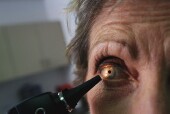
TUESDAY, Dec. 18 (HealthDay News) — Five U.S. eye care providers have been warned to stop misleading advertising about the special lasers used in vision correction procedures such as LASIK, the U.S. Food and Drug Administration said Tuesday.
Those ads and promotional materials do not offer consumers enough information about the potential risks, according to the FDA.
“Advertising by many eye care professionals who perform laser vision correction surgery provides patients with the risk information that they need to make informed decisions,” Steve Silverman, compliance director at FDA’s Center for Devices and Radiological Health, said in an agency news release. “But providers whose advertising does not provide adequate risk information are finding out today that the FDA is serious about consumer protection.”
The FDA said the warnings were sent to: 20/20 Institute Indianapolis LASIK, in Indianapolis; Scott Hyver Visioncare Inc., in Daly City, Calif.; Rand Eye Institute, in Deerfield Beach, Fla.; Eye Center of Texas, in Bellaire; and Woolfson Eye Institute, in Atlanta.
If the providers do not correct their advertising and promotional materials to address the FDA’s concerns, the agency may take further action, including seizures, injunctions and fines, the agency said in its news release.
The most common risks of LASIK surgery include: dry eye syndrome, which can be severe; the possible need for glasses or contact lenses after surgery; vision problems such as halos, glare, starbursts; double vision; and loss of vision.
In May 2009 and September 2001, the FDA issued letters to eye care professionals nationwide outlining the agency’s concerns about improper advertising and promotion of laser eye surgery.
More information
The MedlinePlus Medical Encyclopedia has more about LASIK eye surgery.

